If you've ever wondered about the impact of diet on your poodle's recovery, there are important considerations to explore. When your beloved poodle is facing illness or undergoing recovery, their nutritional needs can significantly influence their healing journey. But what exactly should you be feeding them during this critical time? Stay tuned to uncover essential tips and insights on how to provide optimal nourishment for your poodle's well-being during illness and recovery.
Key Takeaways
- Offer easily digestible foods rich in nutrients and hydration for poodles during illness and recovery.
- Avoid toxic foods and harmful additives while monitoring appetite and adjusting feeding accordingly.
- Incorporate supplements and transition gradually to a regular diet under vet guidance.
- Ensure constant access to fresh water, monitor hydration closely, and consult the vet for concerns.
Proper Hydration for Recovery

During illness and recovery, it is imperative to ensure your poodle stays properly hydrated to support their healing process and maintain vital bodily functions. Hydration plays a critical role in the recovery of sick dogs, as it helps regulate body temperature, aids in digestion, and ensures proper organ function. To prevent dehydration in your poodle, make sure they have access to clean, fresh water at all times. Monitoring your dog's water intake closely is essential to confirm they are staying hydrated, especially during periods of illness. Encouraging your poodle to drink water regularly can help prevent complications and promote a speedier recovery.
In addition to water, offering electrolyte solutions can be advantageous for dogs recovering from illness. These solutions help replenish lost nutrients and minerals, further aiding in hydration and recovery. Be attentive to your poodle's hydration needs, as proper hydration is key to supporting their healing journey.
Nutrient-Rich Diet for Healing
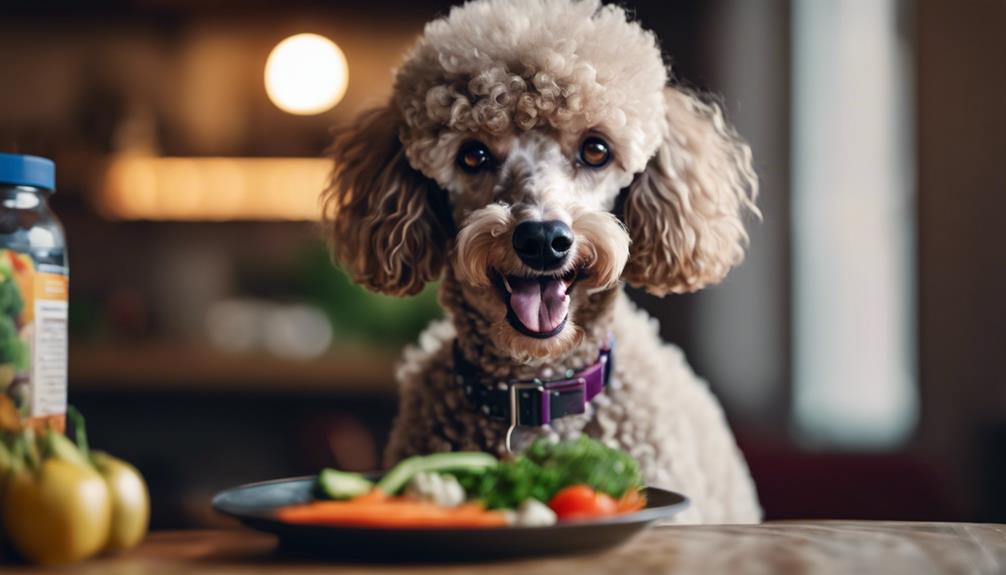
When your Poodle is ill or on the road to recovery, providing a nutrient-rich diet is crucial for their healing process. High-quality proteins, essential fats, and easily digestible carbohydrates play a vital role in supporting their recovery. Ensuring your Poodle receives the necessary vitamins, minerals, and antioxidants can help strengthen their immune system and aid in their healing journey. A balanced diet tailored to meet their specific needs can make a significant difference during this time. Understanding Poodle digestive system basics is essential to ensure that the food you provide is gentle on their stomach and promotes optimal nutrient absorption. Always consult your veterinarian for guidance on the best dietary choices to support your Poodle’s recovery journey effectively.
Healing With Nutrients
For optimal healing and recovery, poodles benefit greatly from a nutrient-rich diet that supports their immune system and aids in tissue repair. By incorporating baby foods like chicken, poodles with lean bodies or in states of illness can receive the increased calories and health benefits needed for healing. Below is a table highlighting key nutrients for poodles during their recovery:
| Nutrient | Role | Food Sources |
|---|---|---|
| High-quality Proteins | Essential for tissue repair and immune function | Chicken, Turkey, Fish |
| Vitamins | Support overall well-being and healing processes | Fruits, Vegetables, Organ meats |
| Minerals | Aid in maintaining energy levels and promoting recovery | Spinach, Pumpkin seeds, Fish |
Providing these nutrients in a balanced and varied manner can aid in a faster and smoother recovery for your beloved poodle.
Recovery Diet Essentials
Transitioning from focusing on healing nutrients, your Poodle's recovery diet essentials are crucial for supporting their healing process. When caring for a sick dog, opt for a recovery diet that is nutrient-rich, high in protein, and easily digestible. These key elements will aid in the healing process by providing the necessary energy and building blocks for tissue repair. Choose high-protein and high-energy foods to promote strength and recovery in your Poodle. Additionally, select foods with easily digestible ingredients to ensure better nutrient absorption during the recovery period. It is essential to offer a tasty and attractive diet to encourage your Poodle to eat and regain strength efficiently. By providing a well-balanced recovery diet, you can help your Poodle recover faster and regain their health.
Poodle's Nutritional Needs
To best support your Poodle's healing and recovery, prioritize a nutrient-rich diet tailored to their specific needs during this critical time. To best support your Poodle's healing and recovery, prioritize a nutrient-rich diet tailored to their specific needs during this critical time. Incorporating wholesome ingredients like lean proteins, fresh vegetables, and healthy fats can significantly boost their immune system and overall health. For pet owners exploring homemade diet tips for Poodles, ensure you consult with your veterinarian to create a balanced meal plan that avoids harmful ingredients and meets all their nutritional requirements. Proper hydration and portion control are also key factors in helping your Poodle regain energy and strength. Additionally, incorporating supplements like omega-3 fatty acids or probiotics, as advised by your veterinarian, can further support their recovery and overall well-being. Monitoring your Poodle’s weight and energy levels can help ensure their diet is meeting the specific nutritional requirements for Poodles during this period. A consistent feeding schedule combined with proper care will provide the foundation your Poodle needs to heal and thrive.
- Provide a nutrient-rich diet: Ensure your Poodle receives a balanced diet high in protein, vitamins, and minerals to support healing and recovery processes.
- Offer easily digestible foods: Opt for options like boiled chicken, white rice, and pumpkin to meet your Poodle's dietary requirements without overtaxing their system.
- Incorporate bone broth: Bone broth can be beneficial for hydration and providing essential nutrients to aid in your Poodle's recovery.
- Ensure hydration: Fresh water should be accessible at all times to maintain proper hydration levels, crucial for supporting your Poodle's healing journey.
Easy-to-Digest Foods for Poodles
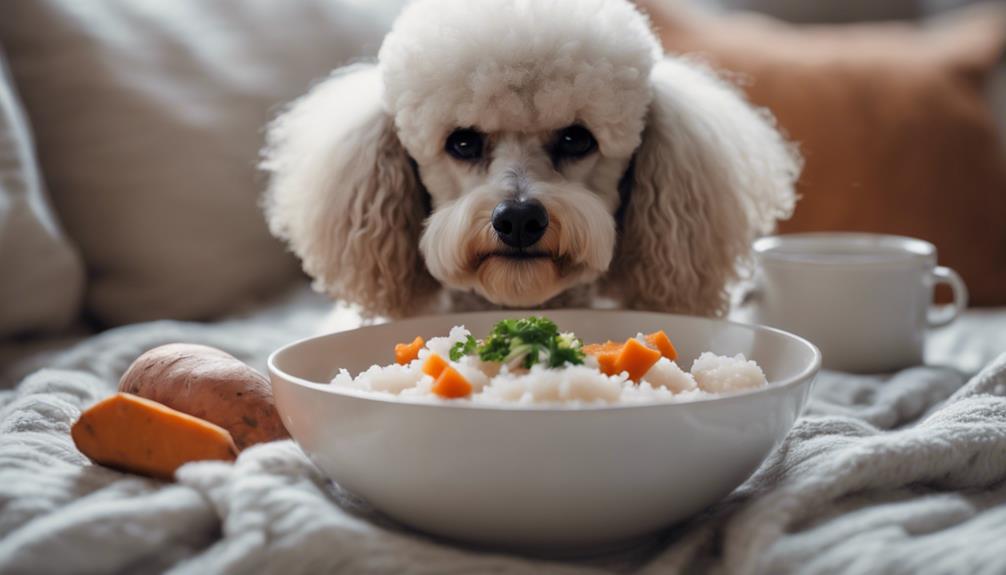
When caring for your poodle during illness and recovery, opt for gentle and easy-to-digest foods such as boiled chicken, white rice, pumpkin, bone broth, and soft baby food to support their healing process. Boiled chicken and white rice are a soothing option for upset stomachs, providing a bland yet nourishing meal. Plain, unseasoned shredded chicken can be particularly enticing for picky eaters feeling unwell. Pumpkin, being high in fiber, assists in regulating digestion, which is beneficial for poodles experiencing tummy troubles. Bone broth serves as a nutritious and easily digestible liquid meal, ideal for sick or recovering poodles. Soft baby food can also be a gentle choice for poodles with digestive discomfort, offering an easy-to-swallow option during their recovery journey. By incorporating these easy-to-digest foods into your poodle's diet, you can help alleviate their stomach issues and aid in a smoother recuperation process.
Avoiding Harmful Ingredients
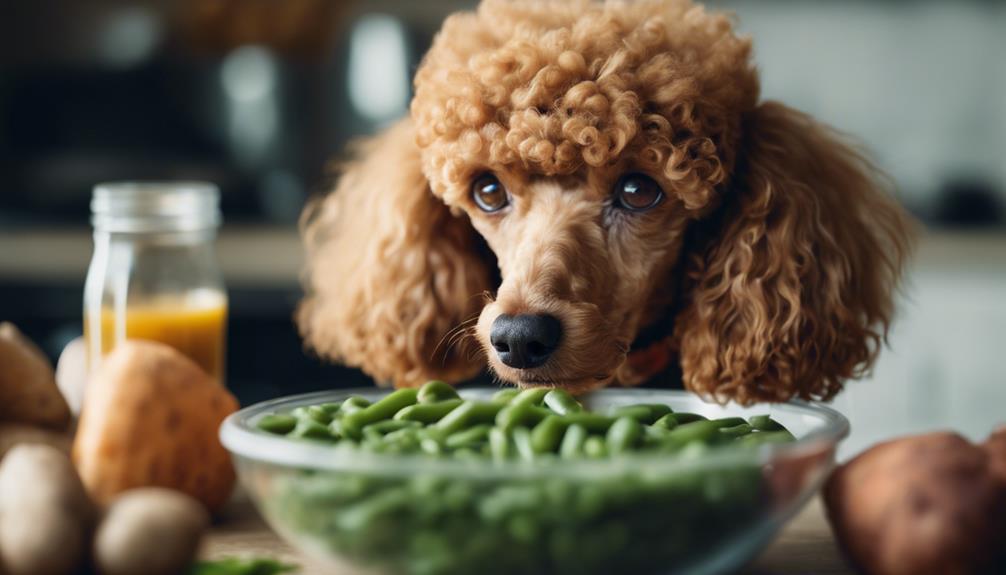
When caring for your poodle during illness, it is crucial to avoid harmful ingredients that could worsen their condition. Toxic foods like chocolate, onions, garlic, and grapes should be kept out of their diet to prevent any complications. Consulting your vet for a complete list of unsafe foods is recommended to ensure your poodle's recovery is not compromised.
Unsafe Food Additives
Harmful food additives, such as artificial colors, flavors, and preservatives, can significantly impact your poodle's health during illness and recovery. To ensure your poodle's well-being, steer clear of toxic ingredients like onion, garlic, xylitol, and artificial sweeteners. Additionally, watch out for high sodium content in additives, as it can lead to dehydration and other health complications. Artificial additives have the potential to trigger allergic reactions or gastrointestinal distress, which may impede your poodle's recovery process. Remember always to read ingredient labels diligently and opt for natural, whole foods to sidestep harmful additives in your poodle's diet during times of illness and recuperation. Your poodle's health is precious, so make informed choices when selecting their food.
Toxic Human Foods
To safeguard your poodle's health during illness and recovery, vigilantly avoid toxic human foods known to be harmful, such as chocolate, onions, garlic, and grapes. These items can be extremely dangerous for poodles and may lead to severe health issues. When feeding your poodle, steer clear of fatty or spicy foods as they can cause stomach irritation, further complicating their recovery process. It's crucial to consult the vet for a comprehensive list of foods to exclude from your poodle's diet during this sensitive time. Ingredients like oils, butter, seasoning (salt, garlic, onion), raw foods, and dairy products should be off-limits as they can exacerbate your poodle's condition. Being cautious and diligent in avoiding harmful human foods is essential for your poodle's well-being while they are ill or recovering.
Feeding Schedule for Recovery Period

Establishing a consistent feeding schedule with small, frequent meals is crucial to supporting your poodle's recovery process. Here are some important guidelines to follow during this period: Make sure to offer easily digestible, high-quality food that meets their nutritional needs, and monitor their appetite and reactions to each meal. One of the common poodle feeding mistakes to avoid is overfeeding, as this can lead to digestive upset or interfere with their recovery. Additionally, steer clear of sudden changes to their diet, as this can cause unnecessary stress on their system. Maintaining a consistent feeding schedule for a poodle can help regulate their digestion and ensure they receive the energy they need to heal and stay active. If your poodle shows signs of discomfort or reduced appetite, consult your veterinarian promptly to make any necessary adjustments. Always remember that sticking to a well-planned feeding routine plays a significant role in promoting both their short-term recovery and long-term well-being.
- Monitor Appetite: Keep a close eye on your poodle's appetite as it can fluctuate during recovery. Adjust the portion sizes accordingly to ensure they are getting enough nourishment.
- Provide Easily Digestible Foods: Offer bland and easily digestible foods like boiled chicken and rice to prevent stomach upset and aid in the healing process. Avoid rich or spicy foods that could aggravate their condition.
- Ensure Hydration: Always have fresh, clean water available for your poodle. Staying hydrated is essential for recovery and overall well-being.
- Follow Feeding Guidelines: Adhere to the feeding recommendations provided by your veterinarian. They will offer tailored advice based on your poodle's specific illness or surgery, helping them recover effectively.
Supplements for Boosting Immunity
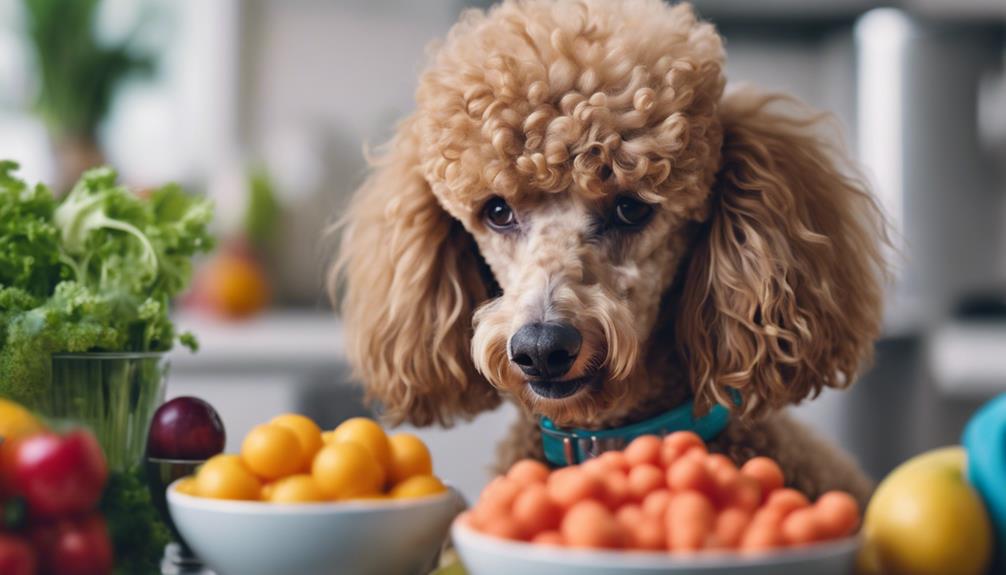
To support your poodle's immune system during illness and recovery, incorporating immune-boosting supplements like vitamin C, vitamin E, probiotics, and omega-3 fatty acids can be beneficial. Vitamin C and E act as antioxidants, helping combat oxidative stress and promoting a stronger immune response in your Poodle. Probiotics aid in gut health, which is closely linked to the immune system. Omega-3 fatty acids, commonly found in fish oil, can help reduce inflammation and overall support immune function in Poodles. Herbal supplements such as echinacea and astragalus may also provide additional immune support during challenging times. However, it is crucial to consult with your veterinarian before introducing any supplements. They can guide you on the appropriate dosage and ensure the supplements are safe and suitable for your Poodle's specific health needs. Prioritizing immune-boosting supplements can play a vital role in helping your furry friend recover and thrive during illness.
Monitoring Weight and Appetite
During your poodle's illness and recovery, closely monitoring their weight and appetite is crucial for ensuring they receive the proper nutrition and tracking their progress towards healing. Here are some essential tips to help you effectively monitor your poodle's weight and appetite:
- Regular Weight Checks: Weigh your poodle regularly to track any fluctuations. Sudden weight loss could be a sign of underlying health issues that need attention.
- Appetite Observation: Keep a close eye on your poodle's appetite. Changes in eating habits can provide valuable insights into their recovery progress.
- Signs of Concern: If you notice significant changes in your poodle's weight or appetite, consult with your veterinarian promptly. Professional guidance can help address any potential health issues.
- Nutritional Well-being: Maintaining a healthy weight and appetite is vital for your poodle's overall well-being during the recovery process. Adjust their feeding plan as needed to support their healing journey.
Gradual Transition to Regular Diet
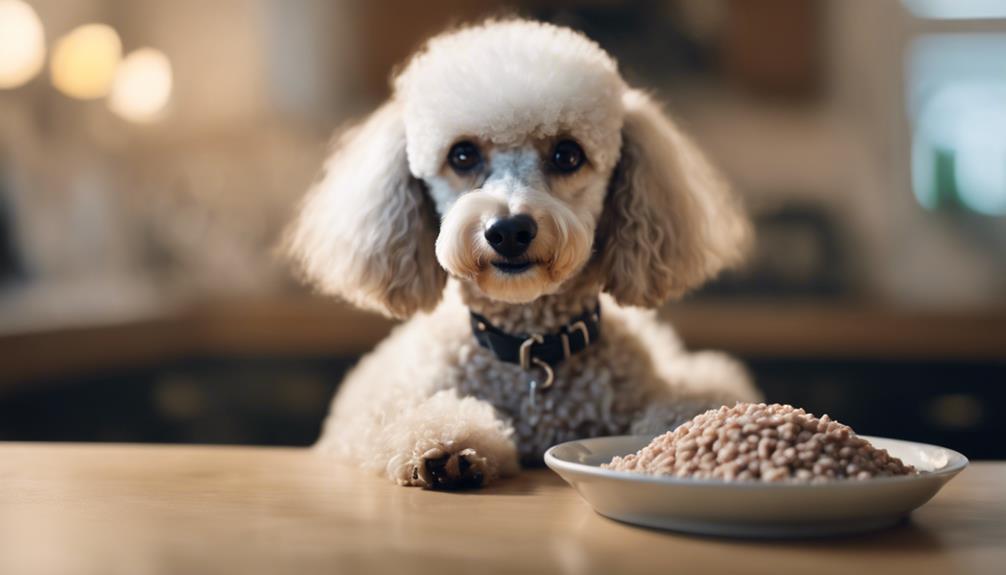
After closely monitoring your poodle's weight and appetite during illness and recovery, it is essential to gradually reintroduce their regular diet to prevent digestive upset. To help with this transition, start by mixing small amounts of their regular food with the recovery food. Make sure to monitor your poodle's response closely and adjust the ratio as needed. Begin by offering a small portion of regular food alongside their recovery diet. If your poodle tolerates this well, slowly increase the proportion of regular food while decreasing the recovery food over the course of several days. This gradual approach will allow your poodle's digestive system to adapt and reduce the risk of gastrointestinal issues. If you have any concerns or questions during this process, consult your vet for guidance on the best way to transition your poodle back to their normal diet. Your attentive care and patience will greatly aid in their recovery.
Frequently Asked Questions
How Do I Make My Dog Feel Better When Sick?
When your dog is sick, offer comforting cuddles, gentle grooming, soothing music, warm blankets, and tasty treats to help them feel better. Creating a calming environment with love and care can make a big difference.
Should I Leave My Sick Dog Alone?
You should provide a comforting presence for your sick dog while monitoring behavior, ensuring safety, and offering love. Giving them alone time when needed can be beneficial. Remember, a balance of companionship and quiet helps in recovery.
How Do I Keep My Dog Hydrated When Sick?
To keep your dog hydrated when sick, offer water regularly, consider using electrolyte solutions, add wet food or broth, monitor intake closely, and ensure easy water access. Syringe feeding may be needed. Think about water bowl placement.
Is Rest Good for Sick Dogs?
Rest is crucial for sick dogs. It aids healing, reduces stress, and restores energy. Create a quiet, comfy space for your furry friend. Monitor symptoms, limit activity, and provide gentle care during resting periods to support recovery.
Conclusion
In conclusion, remember to provide proper hydration, nutrient-rich foods, and easy-to-digest options for your poodle during their illness and recovery. Avoid harmful ingredients, monitor their weight and appetite, and gradually transition them back to their regular diet. By following these guidelines and incorporating supplements for immunity support, you can help your poodle heal and regain their strength effectively. Stay vigilant, stay compassionate, and support your furry friend through this challenging time.
